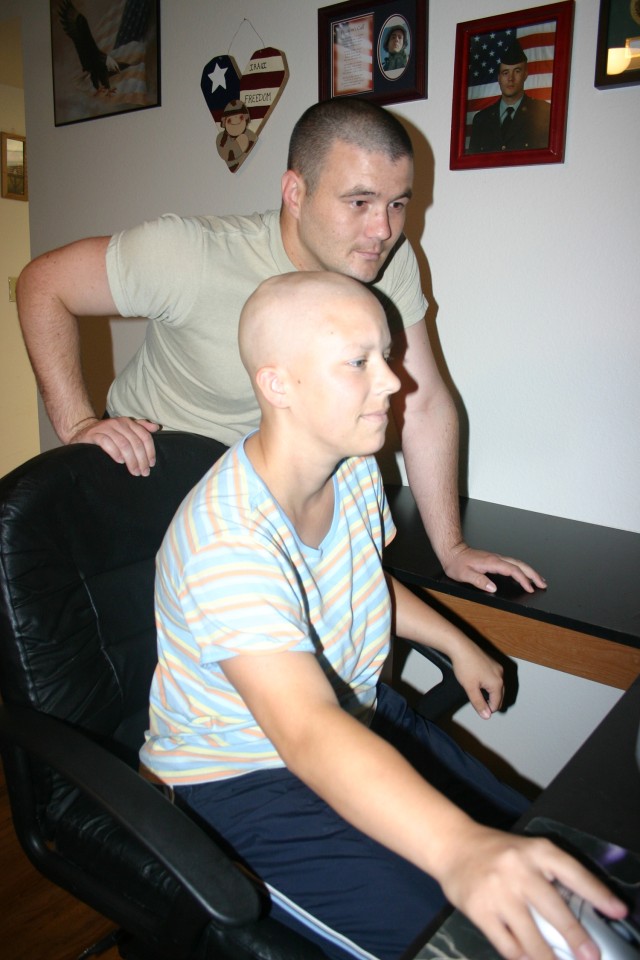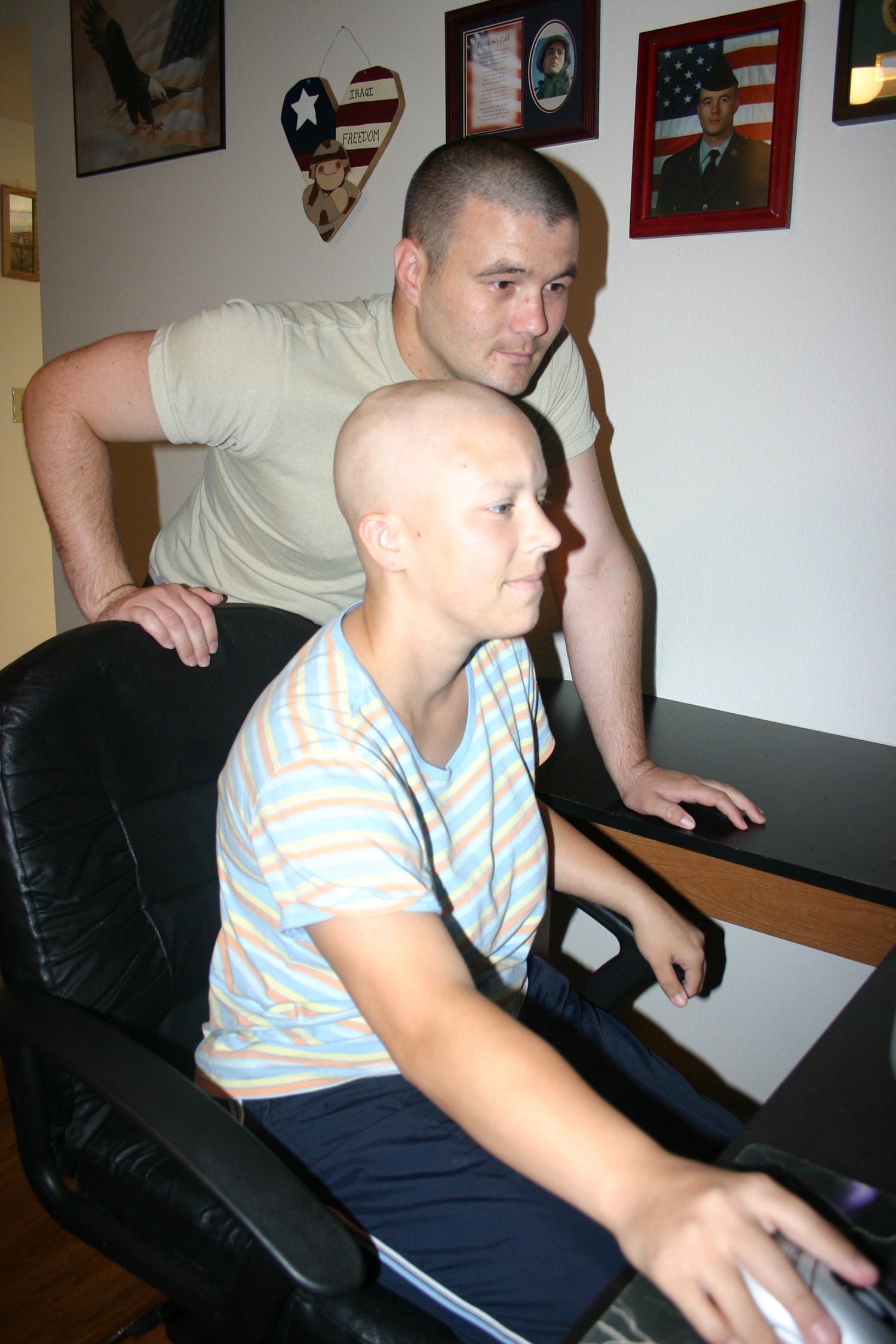
FORT SAM HOUSTON, Texas (Army News Service, Sept. 14, 2006) - A disease has robbed 23-year-old Jenni Craig of her hair, her health and, possibly, her future. But the one thing Jenni and her husband, Spc. William Craig, refuse to let go of is hope.<br/><br/>Jenni is battling Gardner's Syndrome, a rare genetic disease in which the colon, stomach and upper intestine become riddled with polyps. The polyps, or tumors, eventually lead to cancer.<br/><br/>There is no known cure for this disease; doctors can only treat the various ailments that arise from the syndrome. But whether she has 50 days or 50 years, Jenni is determined to find a cure, not just for herself, but for everyone else touched by the disease.<br/><br/>"All I know is we're going to face this disease head on and not let it beat us," she wrote in her online journal.<br/><br/>To help make that happen, Jenni, her husband and a few close family members and friends established the Jenni Renee Foundation this year, a nonprofit organization dedicated to finding a cure, providing funds for health care to those who can't afford it, and educating others, including doctors, about the relatively unknown disease.<br/><br/>Jenni's concern may seem surprising under the circumstances, but caring for others is a way of life for the young mother.<br/><br/>The Missouri native met her husband when she was only 16 years old. They married a year later and soon had two sons, Elijah and Jacob. William joined the Army in 2002 and the growing family moved to Fort Polk, La., in 2003. William left for Iraq and a few days later, Isaac was born.<br/><br/>Alone and busy caring for three boys, the timing couldn't have been worse to have health issues, but "that was when I started having problems," Jenni said.<br/><br/>Jenni felt a large lump in her stomach, later diagnosed as a desmoid tumor, a slow-growing, cancerous group of tumors. She was sent to Brooke Army Medical Center where a colonoscopy revealed hundreds of polyps in her colon, stomach and small intestines.<br/><br/>"The doctors told me it was Gardner's Syndrome," Jenni said. "I had never heard of it."<br/><br/>"A patient with Gardner's Syndrome is someone who has Familial Adenomatous Polyposis (an inherited colorectal cancer syndrome) and other extra-intestinal findings," said Dr. Christopher Jones, assistant chief of oncology at BAMC and Jenni's doctor. "FAP alone accounts for 1 percent of all colon cancers."<br/><br/>Extra-intestinal findings include osteomas (bony growths), cysts, desmoid tumors and thyroid disease.<br/><br/>"I've had them all," Jenni said. "My doctors tell me I have the full-blown case of Gardner's Syndrome."<br/><br/>Jenni went in for surgery and doctors removed the desmoid tumor and her colon in April 2004; her colon was removed as a preventive measure for cancer. Jenni opted to have doctors monitor the polyps found in her rectum with scopes every three months rather than remove her rectum. The polyps in her rectum have a 100 percent chance of turning to cancer.<br/><br/>Despite a frightening diagnosis, Jenni was fine for about a year. Then, one night she had a gut feeling.<br/><br/>"I knew the tumor was back," she said. "I never imagined I'd have to face my worst fears." There was a desmoid tumor growing in the same spot in her abdomen as the last one. She traveled to BAMC again for surgery in March 2005.<br/><br/>"I woke up from the surgery and instantly knew something wasn't right. I could tell," Jenni said.<br/><br/>Jenni had about 10 tumors spreading throughout her kidney, intestines, the main blood vessel to her small intestines and her duodenum, a hollow tube largely responsible for the breakdown of food in the small intestine.<br/><br/>"The doctors said she would bleed to death if they removed the tumors," William said.<br/><br/>It was a no-win scenario - remove them and die, or don't remove them and die. The cancerous tumors would eventually grow too large and interfere with her organs, or the cancer would kill her. The doctors gave Jenni two to 12 months to live.<br/><br/>The doctors planned a course of chemotherapy to shrink the tumors. But, two rounds of chemotherapy and months of nausea and exhaustion later, the treatment was proving worse than the disease - the chemotherapy was ineffective.<br/><br/>Jenni again went in for surgery in April to try for the removal of the desmoid tumor. "I came out of surgery with more bad news," Jenni said.<br/><br/>The 10 tumors had intertwined into one large tumor. "It's attached to vital organs," Jones said. "It's in too many spots for us to cut it out."<br/><br/>"They couldn't get in at all," Jenni said. "They just removed a small part of the tumor."<br/><br/>In the midst of Jenni's health battle, the Craigs decided to test their sons for the genetic disease. As an autosomal dominant syndrome, there was a 50 percent chance her children had inherited the disease.<br/><br/>"We got the results in May and all three of our boys have Gardner's Syndrome," William said.<br/><br/>"It's like flipping the coin three times and coming up with tails every time," Jones said.<br/><br/>Jenni's sons, now 3, 4 and 6, will have to undergo colonoscopies starting at age 11, and, if polyps are found, have their colons removed to prevent an inevitable cancer.<br/><br/>Disheartening news, but the Craigs remain hopeful that the boys won't have the full-blown syndrome like Jenni.<br/><br/>At the moment, Jenni is undergoing another round of chemotherapy, an effort to shrink a desmoid tumor too large and too dangerous to remove. "If this doesn't work, we'll try another round of chemotherapy."<br/><br/>Jenni has endured rounds of chemotherapy, surgeries and even a prediction of death, but she and her husband are still unwilling to accept defeat - for Jenni, their sons or for other syndrome sufferers worldwide.<br/><br/>"We want to do everything in our power to make sure this doesn't happen to our boys or other families," she said.<br/><br/>"My wife and I are so lucky. We're in the military and have all our medical expenses taken care of, but other people can't afford care," said William, who recycles cans to keep the Jenni Renee Foundation running. "We want to make sure everyone can receive the medical care they need."<br/><br/>"This is a deadly disease and we need to find hope for people who do have it," Jenni said.<br/><br/>For more information on the Jenni Renee Foundation, visit <a href = "http://www.jennireneefoundation.com">www.jennireneefoundation.com</a>.

Social Sharing